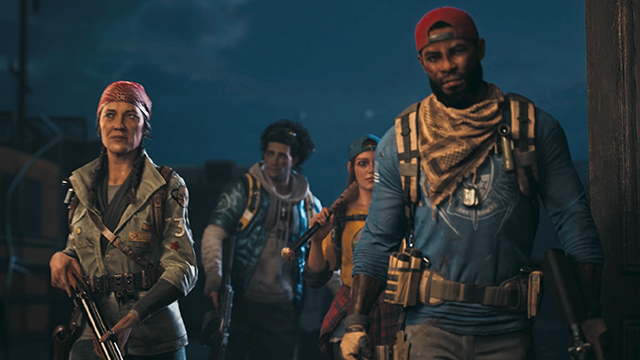Back 4 Blood, Turtle Rock Studios’ spiritual successor to Left 4 Dead, is finally out. It’s been a long time coming. And since it’s been so long, Turtle Rock has had time to learn and grow, especially after creating Evolve, its four-on-one shooter that never quite took off. Senior Gaming Editor Michael Leri recently spoke to Chris Ashton, co-founder and design director at Turtle Rock, about the game and touched on its inclusion on Game Pass, efforts to grab casual players, how the team learned from Evolve, and more.
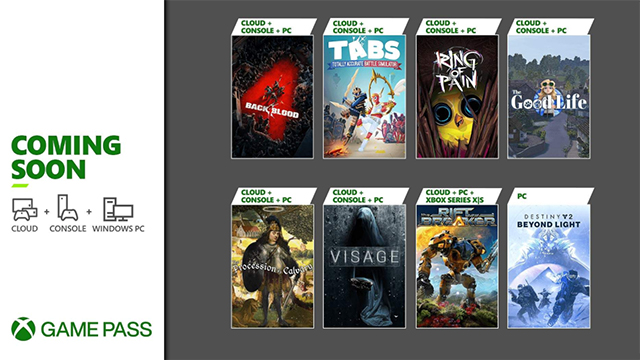
The game is coming to Game Pass on day one. This already seems like a big game with a lot of hype. In your own words, why launch on the service?
Chris Ashton: I think it’s pretty big for us. Part of it is that it’s a multiplayer game — it’s a co-op game and we have PvP —and with a multiplayer game, your community is super critical. Our matchmaking times depend on having enough of a pool and because we’re crossplay as well, it means that really everybody who is on Game Pass will be able to match into games with people on other consoles and whatnot. So it does mean we will have a healthy player pool on day one. Fingers crossed.
And that is super great as far as people being able to find and get into matches quickly. And if you already have a group of friends you’re playing with, awesome. And if you don’t and you’re quick matching in, you’ll be able to find people quite easily in all the different regions that we are in. And that’s big for us.
RELATED: Back 4 Blood Review: Familiar Zombie Action, Even More Replayability
The game has a good accessibility. It has good depth to it with the cards system, the weapon attachments, the number of missions, and the difficulty levels, but it’s always been the intent of the dev team to make sure it is easy to jump in and just start shooting zombies with your friends. I think it probably will appeal to a larger audience than what somebody might expect.
And we saw this even a little bit during the beta. I was jumping into games and ran into this awesome group of three friends and I was the odd forth person. And they were all into rhythm games. That’s what they played the heck out of and then they were playing this game. It’s like they don’t really play any other first-person shooters. But for some reason, this game pulled them in and they were loving it and were super excited about launch and planning on putting in a ton of hours in the game.
I think something like Game Pass is awesome because it removes the barrier. If it is not something you would normally play, but it seems like a social thing and you’re more of a social player, but it doesn’t really cost you anything to try it out, you go in, right? So we will hopefully get those players and reach out to a wider audience than we would have otherwise. I think it’s going to be really good for the game. It’s good for us to have both [kinds of players]. As a studio, we are excited about the prospects.
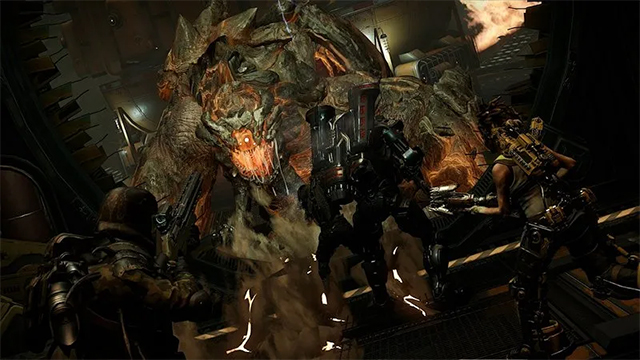
One of the lead writers from Evolve did talk about how some of those barriers were a problem for the game so it seems like Turtle Rock has learned that for this game.
Life is a learning process. We’re all learning and trying to get better. With each game that we work on and release, there are some hard lessons there. Even during game development, we experiment and try stuff. And a lot of the stuff that we are excited about may fail and we’re OK with that and typically we learn from those failures and it makes us do it a better way the next time.
It was one of the reasons we wanted to come back to the genre. We built some other games in between and we’ve learned more. The games industry has changed. More people are online than ever. The platforms are more powerful. So it’s a mix of that and “What could we do if we did it again?”
And also it seems like the timing is good, especially right now. Obviously, we didn’t know when we started development that there was going to be a pandemic and people would be working from home and whatnot. It’s so important for the social aspect of people to be able to talk to friends and have a good time and get their minds out of the train wreck that is a reality for a lot of people right now. The entertainment and social aspects are really good so we are excited to see it released.
While co-op has always been the way to play, what has gone into making sure the solo experience is also enjoyable?
Part of it is the progression system. That was a focus from the beginning. It was actually a really difficult barrier. A progression system inherently splits people just by its nature. If I am going to be rewarded for putting a thousand hours into the game, then you need to reward me with substantial stuff.
And we talked about only doing cosmetics in the beginning but I think that only goes so far. It only keeps your attention for so long so we knew we needed some functionality behind it, but the scary thing is, we’ve all played multiplayer games where we are late to the game and your friends have been playing for weeks and you jump in and you’re outclassed and you can’t keep up. The game maybe does really wacky stuff to try and make it work but it doesn’t really. And then they have to play missions that are too easy or you have to play missions that are too hard.
From the beginning, the thing for us was we wanted players to be able to put in a thousand hours and be able to be rewarded, but also the ability to bring in friends who has never played the game and be able to have a good game. They can still be useful as a teammate in the game and they should be feel rewarded and I should feel rewarded.
RELATED: How Back 4 Blood Is Trying to Build the Biggest Audience Possible
That’s where the card system came in. The core idea there was that it was a shared progression system. If I earn a card that upgrades all the medkits and makes them more effective, then you can still pick up a medkit and use it and it will heal you for more as well. One player’s progression helps all their team’s progression.
It’s sort of a complicated idea from the developer’s side. From the player’s perspective, it doesn’t matter. People might not even think about [the possible discrepancy between hours played in a party]. There’s no weird matchmaking. It’s just normal matchmaking. We join into a party, we play a game, and I have not as cool cards as you, but it all goes into the pool to help the team and we’re effective.
Accessibility was always a focal point of the game. It’s part of the DLC plan, as well. If you own the DLC, there should be no extra steps that I should have to take to be able to play the game with my friends. I can just experience the DLC if I am playing in your game. That stuff was a huge priority to us.
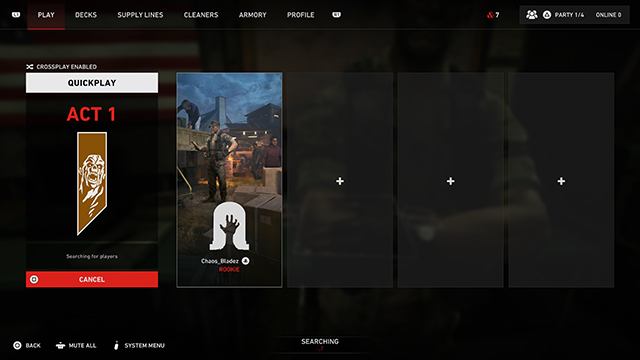
How are solo players that play with random people being supported as well as those who play completely by themselves with bots? [Note: This interview took place well before it came out that those who played with didn’t earn cards or Supply Points. Turtle Rock later said it is discussing possible solutions.]
We were surprised at the amount of people that played our past games solo with bots. It’s not everyone’s thing to play online with others. Maybe they just want to have fun and don’t want to worry about the social element. The hope is always that you still get to experience the game and progression but sooner or later, you’ll dip your toe into the multiplayer aspect.
During the beta, I exclusively played quick matching. Part of it was because I wanted to see what people were talking about and how they were reacting. And to some degree, it’s kind of hard to coordinate with your friends and all be online at the same time. My best friend is in Utah and it’s a two-hour time difference and he’s got kids and I don’t and so I get on at 9 p.m. and he’s already been in bed for two hours. The reality was that he and I didn’t get to play during the beta but he played and I played through quick matching.
And if you quick match in and then play full missions, you get credit on the progression and stuff. We just wanted to make sure that, no matter how you played and it didn’t matter how much time you put in, your playtime should be fun and rewarding and there’s always some sort of thing you’re working toward, whether it’s a gold Desert Eagle skin, a card in the caravan, or just trying to get to the end of the campaign on the highest difficulty. And you can work toward all that solo, as a quick matcher, or with your friends. You should be able to play the game however you want.
As evidenced by your Utah-based friend, trying to coordinate sessions as an adult can be hard. And that was often a problem with Evolve as it seemed to almost require four or five people where it doesn’t seem as vital for Back 4 Blood.
100%, yeah. That was one of our learnings coming out of our previous games. Evolve was great if you played it the way it was supposed to be played and if you knew what the roles were. In this game, with the card system and stuff, we really want players to define their own roles. You can have ADS or not have it. If you don’t want sprint, you can remove it for a bonus. You can customize your game and you can make it feel more like Doom or Call of Duty or Left 4 Dead.
Aside from becoming stronger in the game or changing your stats for better, the cards also let you customize the controls to make it how you want to be.
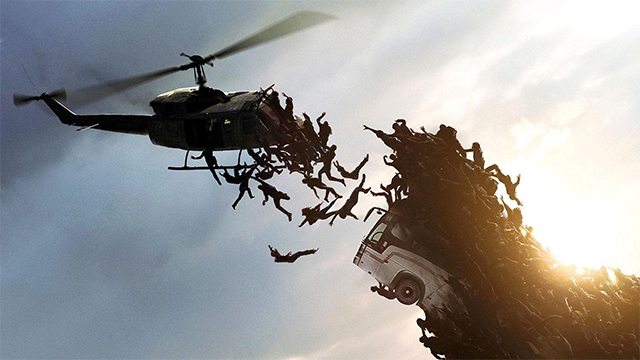
Were there any horror films or TV shows influenced the game?
Not any particular ones. There are a lot of good movie moments in a lot of different monster and zombie movies. A lot of character moments and action moments and stuff. And we tried to create a game where those things can play out and we don’t script them, necessarily. But we want that stuff to kind of play out sometimes like being the last one alive to make it to the safe room at the very end to bring your whole team back. There are a lot of moments like that you might see in movies, but there’s not anything too specific on this one. But in general, of course.
